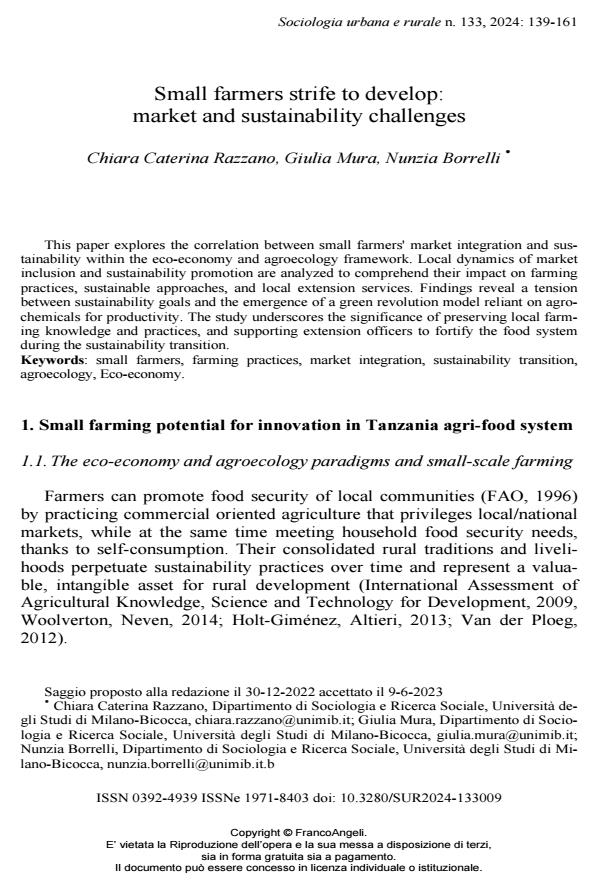Small farmers strife to develop: market and sustainability challenges
Titolo Rivista SOCIOLOGIA URBANA E RURALE
Autori/Curatori Chiara Caterina Razzano, Giulia Mura, Nunzia Borrelli
Anno di pubblicazione 2024 Fascicolo 2024/133
Lingua Inglese Numero pagine 23 P. 139-161 Dimensione file 330 KB
DOI 10.3280/SUR2024-133009
Il DOI è il codice a barre della proprietà intellettuale: per saperne di più
clicca qui
Qui sotto puoi vedere in anteprima la prima pagina di questo articolo.
Se questo articolo ti interessa, lo puoi acquistare (e scaricare in formato pdf) seguendo le facili indicazioni per acquistare il download credit. Acquista Download Credits per scaricare questo Articolo in formato PDF

FrancoAngeli è membro della Publishers International Linking Association, Inc (PILA), associazione indipendente e non profit per facilitare (attraverso i servizi tecnologici implementati da CrossRef.org) l’accesso degli studiosi ai contenuti digitali nelle pubblicazioni professionali e scientifiche.
This paper explores the correlation between small farmers' market integration and sustain-ability within the eco-economy and agroecology framework. Local dynamics of market inclu-sion and sustainability promotion are analyzed to comprehend their impact on farming practic-es, sustainable approaches, and local extension services. Findings reveal a tension between sustainability goals and the emergence of a green revolution model reliant on agrochemicals for productivity. The study underscores the significance of preserving local farming knowledge and practices, and supporting extension officers to fortify the food system during the sustainability transition.
Questo studio esplora la correlazione tra l'integrazione di piccoli agricoltori nei mercati e la promozione della sostenibilità, adottando il framework teorico dell'e-co-economy e agro-ecology. Le dinamiche locali sono analizzate per comprendere il loro impatto sulle pratiche agricole e i servizi degli extension officer. I risultati evidenziano una tensione tra gli obiettivi di sostenibilità e un modello di rivoluzio-ne verde basato su agrochimici. Si sottolinea l'importanza di preservare le cono-scenze agricole locali e sostenere gli extension officer per rafforzare il sistema ali-mentare nella transizione verso la sostenibilità.
Parole chiave:piccoli agricoltori, pratiche di coltivazione, integrazione dei merca-ti, transizione sostenibile, agroecology, Eco-economy.
Chiara Caterina Razzano, Giulia Mura, Nunzia Borrelli, Small farmers strife to develop: market and sustainability challenges in "SOCIOLOGIA URBANA E RURALE" 133/2024, pp 139-161, DOI: 10.3280/SUR2024-133009